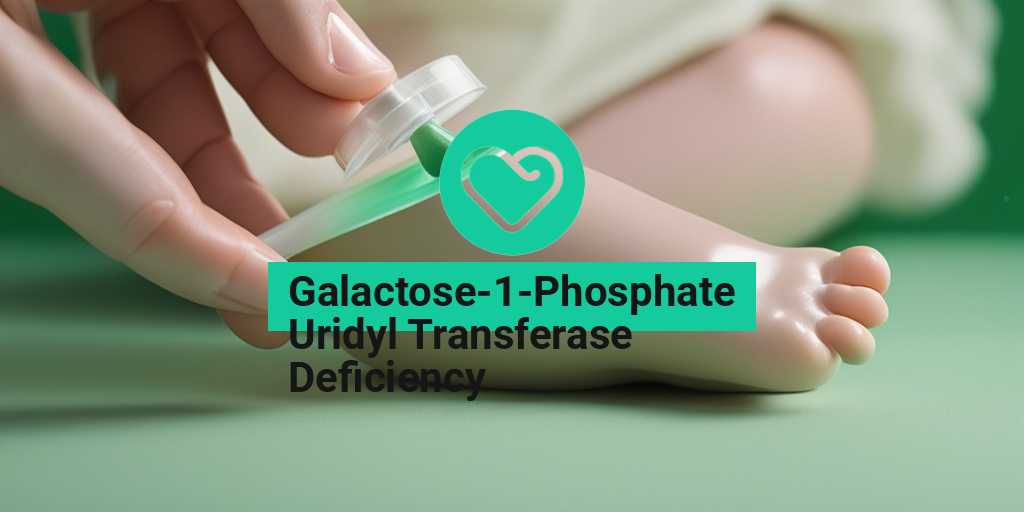What Is Galactose-1-Phosphate Uridyl Transferase Deficiency?
Galactose-1-phosphate uridyl transferase deficiency is a rare genetic disorder that affects the body’s ability to metabolize galactose, a type of sugar found in milk and other dairy products. This condition is also known as galactosemia, and it’s caused by a deficiency of the enzyme galactose-1-phosphate uridyl transferase, which is necessary for the breakdown of galactose.
The Role of Galactose-1-Phosphate Uridyl Transferase
In a normal individual, the enzyme galactose-1-phosphate uridyl transferase converts galactose-1-phosphate into glucose-1-phosphate, which can then be used by the body for energy production. However, in individuals with galactose-1-phosphate uridyl transferase deficiency, this enzyme is either missing or not functioning properly, leading to a buildup of galactose-1-phosphate in the body.
Causes and Inheritance
Galactose-1-phosphate uridyl transferase deficiency is an autosomal recessive disorder, meaning that a person must inherit two copies of the mutated gene (one from each parent) to develop the condition. Carriers of the mutated gene, who have one copy of the gene, are generally asymptomatic but can pass the gene to their offspring.
Understanding Galactosemia
Galactosemia is a broader term that encompasses a group of disorders that affect the body’s ability to metabolize galactose. There are three types of galactosemia, each caused by a deficiency of a different enzyme involved in galactose metabolism:
- Galactose-1-phosphate uridyl transferase deficiency: This is the most common type of galactosemia, accounting for about 90% of cases.
- Galactokinase deficiency: This type of galactosemia is caused by a deficiency of the enzyme galactokinase, which is necessary for the conversion of galactose into galactose-1-phosphate.
- UDP-galactose 4-epimerase deficiency: This type of galactosemia is caused by a deficiency of the enzyme UDP-galactose 4-epimerase, which is necessary for the conversion of UDP-galactose into UDP-glucose.
Galactosemia can cause a range of symptoms, including:
- Failure to thrive
- Vomiting
- Diarrhea
- J Jaundice
- Seizures
- Developmental delays
If left untreated, galactosemia can lead to serious complications, such as intellectual disability, speech and language difficulties, and increased risk of infections. However, with early diagnosis and treatment, which typically involves a galactose-restricted diet, many individuals with galactosemia can lead normal, healthy lives.
If you or a loved one has been diagnosed with galactose-1-phosphate uridyl transferase deficiency or galactosemia, it’s essential to work with a healthcare provider to develop a personalized treatment plan. Additionally, resources like Yesil Health AI (yesilhealth.com) can provide valuable insights and evidence-based information to help you navigate this complex condition. 💡

Causes of Galactose-1-Phosphate Uridyl Transferase Deficiency
Galactose-1-phosphate uridyl transferase deficiency, also known as GALT deficiency, is a rare genetic disorder that affects the body’s ability to metabolize galactose, a type of sugar found in milk and other dairy products. The deficiency occurs when there is a mutation in the GALT gene, which codes for the enzyme galactose-1-phosphate uridyl transferase. This enzyme plays a crucial role in the breakdown of galactose into glucose, a sugar that can be used by the body for energy.
Inheritance Pattern
The GALT deficiency is inherited in an autosomal recessive pattern, which means that a person needs to inherit two copies of the mutated gene (one from each parent) to develop the condition. If a person inherits only one copy of the mutated gene, they will be a carrier of the condition but will not develop symptoms themselves.
Genetic Mutations
There are several genetic mutations that can lead to GALT deficiency, including point mutations, deletions, and insertions. These mutations can affect the structure and function of the galactose-1-phosphate uridyl transferase enzyme, leading to a deficiency in its activity.
Other Factors
In addition to genetic mutations, other factors can contribute to the development of GALT deficiency. For example, breastfeeding can exacerbate the condition, as breast milk contains high levels of galactose. Additionally, certain medications and environmental toxins may also play a role in the development of GALT deficiency.
Symptoms of Galactose-1-Phosphate Uridyl Transferase Deficiency
The symptoms of GALT deficiency can vary in severity and may appear within the first few days or weeks of life. In some cases, symptoms may not appear until later in childhood or even adulthood.
Early Symptoms
Newborns with GALT deficiency may exhibit the following early symptoms:
- Vomiting after feeding
- Diarrhea
- Jaundice (yellowing of the skin and eyes)
- Lethargy (excessive sleepiness)
- Failure to thrive (poor weight gain)
Late-Onset Symptoms
In older children and adults, GALT deficiency may cause:
- Developmental delays
- Intellectual disability
- Speech difficulties
- Seizures
- Vision problems
If left untreated, GALT deficiency can lead to serious complications, including liver damage, kidney damage, and cognitive impairment. Early diagnosis and treatment are crucial to preventing these complications and improving outcomes for individuals with GALT deficiency. 💊

Diagnosis of Galactose-1-Phosphate Uridyl Transferase Deficiency
Galactose-1-phosphate uridyl transferase deficiency, a rare genetic disorder, can be challenging to diagnose due to its rarity and similarity in symptoms with other conditions. However, early diagnosis is crucial to prevent long-term complications and improve the quality of life for affected individuals. 🌟
Screening Tests
Newborn screening tests are essential in detecting galactose-1-phosphate uridyl transferase deficiency. These tests typically involve a heel prick blood test, which measures the levels of galactose-1-phosphate in the blood. Elevated levels of galactose-1-phosphate indicate a potential deficiency. 💉
Confirmatory Tests
Once the screening test suggests a deficiency, confirmatory tests are necessary to rule out other conditions. These tests may include:
- Enzyme assay: This test measures the activity of the galactose-1-phosphate uridyl transferase enzyme in red blood cells.
- Molecular genetic testing: This test analyzes the GALT gene, which codes for the galactose-1-phosphate uridyl transferase enzyme, to identify mutations.
- Galactose tolerance test: This test evaluates the body’s ability to metabolize galactose.
Clinical Evaluation
A thorough clinical evaluation is essential to assess the presence of symptoms and signs associated with galactose-1-phosphate uridyl transferase deficiency. These may include:
- Vomiting and diarrhea: Frequent vomiting and diarrhea can lead to dehydration and electrolyte imbalance.
- Failure to thrive: Affected infants may exhibit poor weight gain, lethargy, and developmental delays.
- Ocular symptoms: Cataracts, lens dislocation, and vision impairment may occur due to the accumulation of galactose-1-phosphate in the lens.
- Hepatomegaly: Enlargement of the liver may be present due to the accumulation of galactose-1-phosphate.
Treatment Options for Galactose-1-Phosphate Uridyl Transferase Deficiency
While there is no cure for galactose-1-phosphate uridyl transferase deficiency, early diagnosis and treatment can significantly improve the quality of life for affected individuals. The primary goal of treatment is to eliminate galactose from the diet and manage associated symptoms. 🥗
Dietary Restrictions
A galactose-restricted diet is essential to prevent the accumulation of toxic compounds. This involves:
- Avoiding galactose-containing foods: Breast milk, lactose-containing formulas, and galactose-rich foods like dairy products, legumes, and certain fruits and vegetables should be avoided.
- Using galactose-free formulas: Specialized formulas that do not contain galactose can be used as an alternative to breast milk or lactose-containing formulas.
Supportive Care
Supportive care is crucial to manage associated symptoms and prevent complications. This may include:
- Fluid and electrolyte management: Intravenous fluids and electrolyte supplements may be necessary to manage dehydration and electrolyte imbalance.
- Vitamin and mineral supplements: Supplements like vitamin B12, vitamin D, and calcium may be necessary to prevent deficiencies.
- Ophthalmological care: Regular eye exams and cataract surgery may be necessary to manage ocular symptoms.
Early diagnosis and treatment can significantly improve the prognosis for individuals with galactose-1-phosphate uridyl transferase deficiency. With proper management, affected individuals can lead a relatively normal life. 💕

Managing Galactose-1-Phosphate Uridyl Transferase Deficiency
Galactose-1-phosphate uridyl transferase deficiency is a rare genetic disorder that affects the body’s ability to metabolize galactose, a sugar found in milk and other dairy products. If left untreated, this deficiency can lead to serious health complications. However, with proper management, individuals with this condition can lead a relatively normal life. In this article, we’ll explore the ways to manage galactose-1-phosphate uridyl transferase deficiency and reduce its impact on daily life.
Dietary Restrictions
The primary goal of managing galactose-1-phosphate uridyl transferase deficiency is to limit the intake of galactose. This means avoiding or reducing consumption of:
- Milk and dairy products, such as cheese, yogurt, and ice cream
- Foods containing lactose, like bread, cereals, and instant soups
- Galactose-rich fruits and vegetables, like avocados, apricots, and pears
Instead, individuals with this deficiency should focus on consuming:
- Galactose-free or low-galactose foods, such as fruits, vegetables, and meats
- Lactose-free or low-lactose dairy products, like almond milk or soy milk
Breastfeeding and Infant Care
For infants with galactose-1-phosphate uridyl transferase deficiency, breastfeeding can be challenging. However, with proper guidance, mothers can continue to breastfeed their babies while ensuring they receive the necessary nutrients. This may involve:
- Supplementing breast milk with galactose-free formula
- Monitoring the baby’s galactose levels and adjusting the diet accordingly
Medications and Supplements
In some cases, medications or supplements may be necessary to manage the symptoms of galactose-1-phosphate uridyl transferase deficiency. These may include:
- Vitamin supplements, like vitamin B12 or vitamin K
- Medications to treat related health issues, such as seizures or liver damage
Regular Monitoring and Testing
Regular monitoring and testing are crucial for managing galactose-1-phosphate uridyl transferase deficiency. This includes:
- Regular blood tests to monitor galactose levels
- Urine tests to check for galactose metabolites
- Regular check-ups with a healthcare provider to monitor overall health
Complications of Untreated Galactose-1-Phosphate Uridyl Transferase Deficiency
If left untreated, galactose-1-phosphate uridyl transferase deficiency can lead to serious health complications. Some of the potential complications include:
Seizures and Neurological Damage
Untreated galactose-1-phosphate uridyl transferase deficiency can cause seizures, which can lead to neurological damage and developmental delays. In severe cases, this can result in:
- Cerebral palsy
- Intellectual disability
- Speech and language difficulties
Liver and Kidney Damage
The accumulation of galactose in the body can cause liver and kidney damage, leading to:
- Liver failure
- Kidney failure
- Jaundice
Ocular Complications
Untreated galactose-1-phosphate uridyl transferase deficiency can also cause ocular complications, including:
- Cataracts
- Glaucoma
- Vision loss
It’s essential to work with a healthcare provider to manage galactose-1-phosphate uridyl transferase deficiency and prevent these complications. With proper treatment and care, individuals with this condition can lead a healthy and fulfilling life. 💊

Frequently Asked Questions about Galactose-1-Phosphate Uridyl Transferase Deficiency
What is Galactose-1-Phosphate Uridyl Transferase Deficiency?
Galactose-1-phosphate uridyl transferase deficiency is a rare genetic disorder that affects the body’s ability to metabolize galactose, a type of sugar found in milk and other dairy products. It is caused by a deficiency of the enzyme galactose-1-phosphate uridyl transferase, which is necessary for the breakdown of galactose.
What are the symptoms of Galactose-1-Phosphate Uridyl Transferase Deficiency?
The symptoms of galactose-1-phosphate uridyl transferase deficiency can vary in severity and may include:
- Fever
- Vomiting
- Diarrhea
- Lethargy
- Seizures
- Developmental delays
- Cataracts
How is Galactose-1-Phosphate Uridyl Transferase Deficiency diagnosed?
Galactose-1-phosphate uridyl transferase deficiency is typically diagnosed through a combination of clinical evaluation, laboratory tests, and genetic testing. These may include:
- Blood tests to measure galactose levels
- Urine tests to measure galactose-1-phosphate levels
- Genetic testing to identify mutations in the GALT gene
How is Galactose-1-Phosphate Uridyl Transferase Deficiency treated?
Treatment for galactose-1-phosphate uridyl transferase deficiency typically involves a galactose-restricted diet, which eliminates or severely limits galactose-containing foods and beverages. In some cases, supplements may be necessary to ensure adequate nutrition.
Is Galactose-1-Phosphate Uridyl Transferase Deficiency inherited?
Yes, galactose-1-phosphate uridyl transferase deficiency is an inherited disorder caused by mutations in the GALT gene. It is typically inherited in an autosomal recessive pattern, meaning that a child must inherit two copies of the mutated gene (one from each parent) to develop the condition.
Can Galactose-1-Phosphate Uridyl Transferase Deficiency be prevented?
While galactose-1-phosphate uridyl transferase deficiency cannot be prevented, early diagnosis and treatment can help prevent or reduce the severity of symptoms. Pregnant women can also undergo carrier testing to determine if they are carriers of the mutated GALT gene.
What is the prognosis for individuals with Galactose-1-Phosphate Uridyl Transferase Deficiency?
The prognosis for individuals with galactose-1-phosphate uridyl transferase deficiency varies depending on the severity of the condition and the promptness of treatment. With early diagnosis and treatment, many individuals can lead normal or near-normal lives. However, if left untreated, the condition can lead to serious complications and even death.
Is breastfeeding safe for mothers with Galactose-1-Phosphate Uridyl Transferase Deficiency?
Mothers with galactose-1-phosphate uridyl transferase deficiency can breastfeed their babies, but they should be aware of the risks and take necessary precautions. Breast milk contains galactose, which can be harmful to infants with the condition. Mothers should consult with their healthcare provider to determine the best course of action.
What is the genetic basis of Galactose-1-Phosphate Uridyl Transferase Deficiency?
Galactose-1-phosphate uridyl transferase deficiency is caused by mutations in the GALT gene, which codes for the enzyme galactose-1-phosphate uridyl transferase. These mutations can lead to a deficiency or complete absence of the enzyme, resulting in the accumulation of toxic compounds and the development of symptoms.
How common is Galactose-1-Phosphate Uridyl Transferase Deficiency?
Galactose-1-phosphate uridyl transferase deficiency is a rare genetic disorder, affecting approximately 1 in 40,000 to 1 in 60,000 births worldwide.
What are the long-term effects of Galactose-1-Phosphate Uridyl Transferase Deficiency?
If left untreated, galactose-1-phosphate uridyl transferase deficiency can lead to serious long-term effects, including:
- Intellectual disability
- Speech and language delays
- Seizures and epilepsy
- Cataracts and vision loss
- Developmental delays and disabilities
Is there a cure for Galactose-1-Phosphate Uridyl Transferase Deficiency?
There is currently no cure for galactose-1-phosphate uridyl transferase deficiency. However, early diagnosis and treatment can help manage the condition and prevent or reduce the severity of symptoms.
What research is being done on Galactose-1-Phosphate Uridyl Transferase Deficiency?
Researchers are actively working to develop new treatments and therapies for galactose-1-phosphate uridyl transferase deficiency. This includes investigating new enzyme replacement therapies, gene therapies, and other potential treatments.
Where can I find more information on Galactose-1-Phosphate Uridyl Transferase Deficiency?
There are many resources available for individuals and families affected by galactose-1-phosphate uridyl transferase deficiency. These include:
- National Organization for Rare Disorders (NORD)
- Genetic Alliance
- Galactosemia Foundation
- Online support groups and forums
Remember to consult with a healthcare professional for personalized information and guidance. 💊




